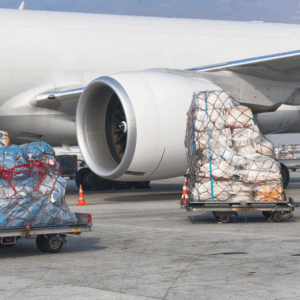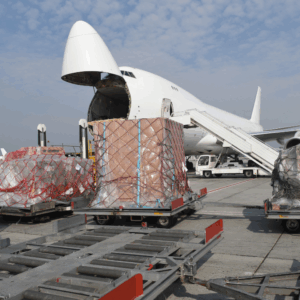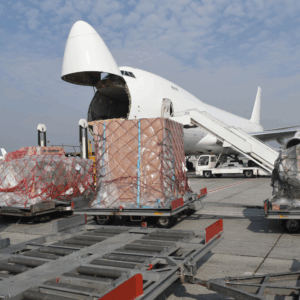
Air Cargo Management: Efficiency, Speed, and Digital Transformation
Air cargo represents a small portion of the total volume of goods transported but accounts for a disproportionately high share of global trade value. As detailed in Air Cargo Management, air transport is crucial for industries that require speed, security, and precision. Sectors such as electronics, pharmaceuticals, fashion, automotive, and perishables rely heavily on efficient air logistics. It’s not just about moving boxes; it’s about ensuring time-sensitive, value-driven supply chains function without disruption.
The air logistics chain is structured through logistics integrators, airlines, freight forwarders, and ground services. Key elements include cargo consolidation, the availability of LCL and FCL services, and road feeder connectivity. Exfreight enables full automation of these processes through an API-connected platform, offering dynamic quotes, online booking, and real-time tracking. This model allows businesses of all sizes to operate with agility in international markets. Cloud-based technology and GPS tracking ensure operational efficiency, regulatory compliance, and a reduction in errors. In today’s landscape, logistics traceability is not a luxury; it’s a competitive necessity.
China’s International Air Freight Network: The Core of Global Trade
China has positioned itself as the epicenter of international logistics, especially in air freight. According to the Analysis of Mainland China’s International Air Cargo Network, 
China’s exports follow integrated logistics models that combine ground pickup, regional hub consolidation, and scheduled flights. The high volume and operational density require precise synchronization. Exfreight leverages this infrastructure with features such as door-to-door rates, integrated bookings, and global visibility. Customs integration and automated documentation further reduce transit times and avoid extra costs.
A key challenge for China’s air cargo network is sustaining efficiency amid growing global demand. The solution lies in adopting digital platforms that enable both local and international freight forwarders to optimize space, manage bookings across multiple airlines, and ensure regulatory compliance in demanding markets like the EU and U.S. Digital logistics transformation is not only maintaining China’s leadership, but it’s also enhancing its resilience against geopolitical shifts, fluctuating demand, and evolving trade routes.
Container Shipping: Flexibility and Global Reach in Maritime Logistics
Container shipping is the backbone of modern maritime trade. Since the launch of the first specialized container ship in the 1950s, the industry has evolved into a complex and efficient global network. According to Container Shipping by Theo Notteboom, the standardization of container sizes (TEU and FEU) has enabled seamless integration with rail and truck transport, fueling global commerce at an unprecedented scale.
Maritime transport’s efficiency stems from its ability to move large volumes of goods at low cost, with reliability and predictability. Multinational companies design their supply chains around available maritime routes, leveraging economies of scale and consistent transit times to optimize their operations. The rise in e-commerce and supplier diversification has created new demands for the industry: higher frequency, more flexible routes, and total shipment visibility. Exfreight addresses these needs through integrated volume-based pricing, route simulation, and cargo consolidation tools that help reduce costs without compromising delivery times.

Digital Freight Forwarders and the Exfreight Model: A New Era of Logistics
The digital freight forwarder model championed by Exfreight marks a structural shift in how international shipments are managed. Through its Exfresso platform, companies can quote, book, track, and integrate all logistics processes in a single environment. This eliminates the need for emails, calls, and spreadsheets, providing complete visibility and enabling data-driven decision-making. international shipments
Exfreight’s open API architecture enables direct integration with enterprise TMS and ERPs, allowing for functions such as automated purchase order creation, shipping document generation, and carrier assignment. Its system uses density-based pricing, preventing reclassifications and hiding fees. Additional features include integrated cargo insurance, estimated duty and tax calculations for over 150 countries, and tailored services for Amazon FBA deliveries. Logistics traceability is further enhanced through automatic email alerts, geolocation tracking, and cloud-based document access.
This approach democratizes access to tools that were previously reserved for major logistics operators. Small and medium-sized businesses can now compete globally without sacrificing margins or 
Global trade demands logistics solutions that are fast, reliable, and transparent. Air cargo management, container shipping efficiency, and digital integration are now essential for success in international markets. China continues to set the pace through its connected hubs and high-capacity operations. The rise of platforms like Exfreight is redefining the freight forwarder concept, transforming it into a technological ecosystem that empowers businesses of all sizes.
In today’s logistics landscape, digitization is no longer optional; it has become the new standard. Automated bookings, end-to-end visibility, and global connectivity form the foundation of modern supply chains. Exfreight and its Exfresso platform represent the future of international logistics, enabling smarter, more efficient, and more profitable operations.
Would you be ready to transform your logistics? Start with Exfreight and optimize your supply chain through comprehensive solutions and cutting-edge technology.
Frequently Asked Questions (FAQs)
What is Air Cargo Management?

Why is China critical to international trade?
It hosts major global logistics hubs and an air network that connects to the world’s top consumption and production markets.
What are the advantages of container shipping?
It enables the efficient and standardized movement of large volumes of goods at a low cost, with seamless multimodal integration.
How does a platform like Exfreight work?
It offers instant quotes, online bookings, shipment tracking, document management, and API connectivity for process integration.
What does a digital freight forwarder mean?
It’s a logistics operator that utilizes technology to automate processes such as booking, tracking, and consolidation, thereby optimizing freight operations.



Leave A Comment
You must be logged in to post a comment.